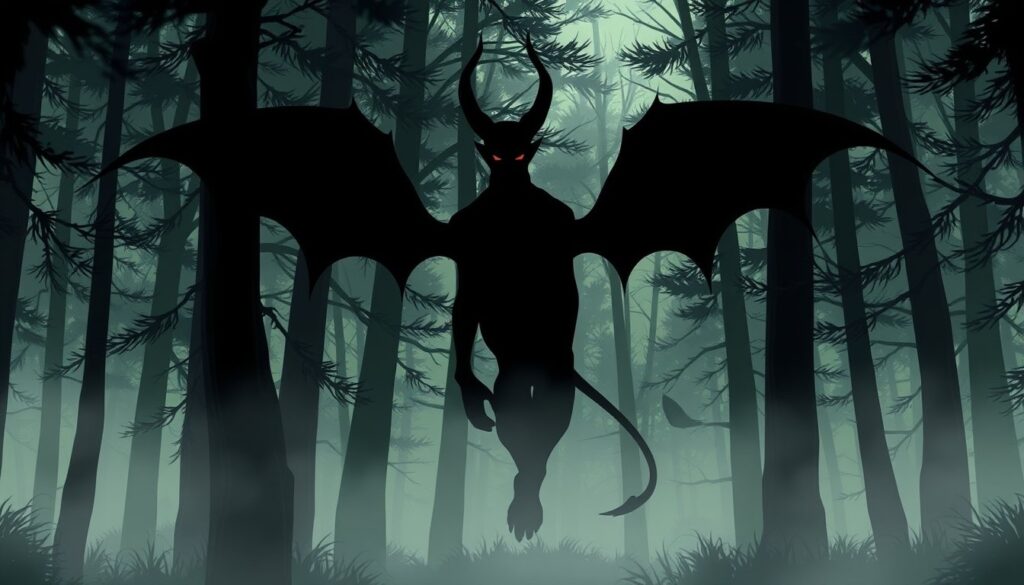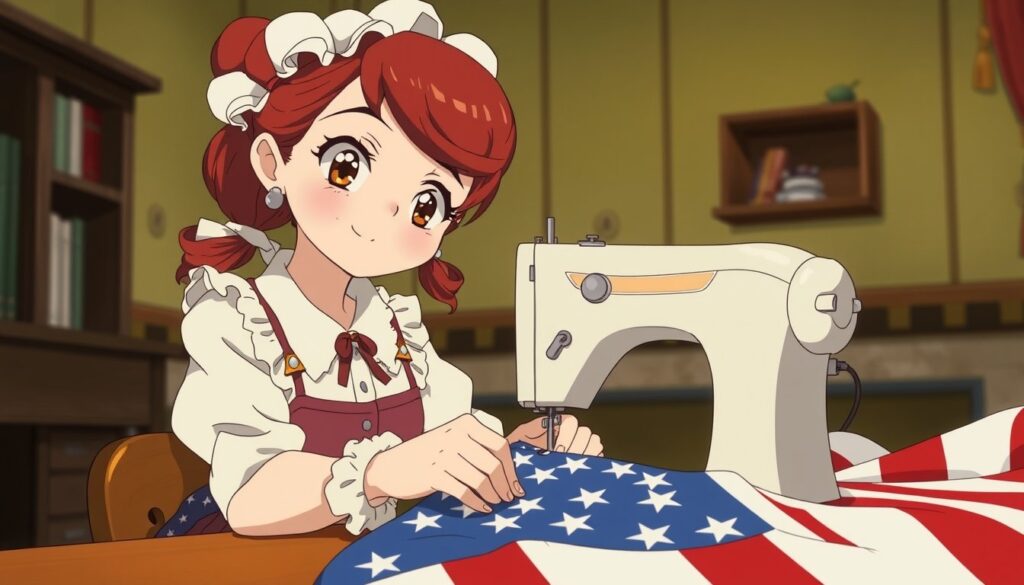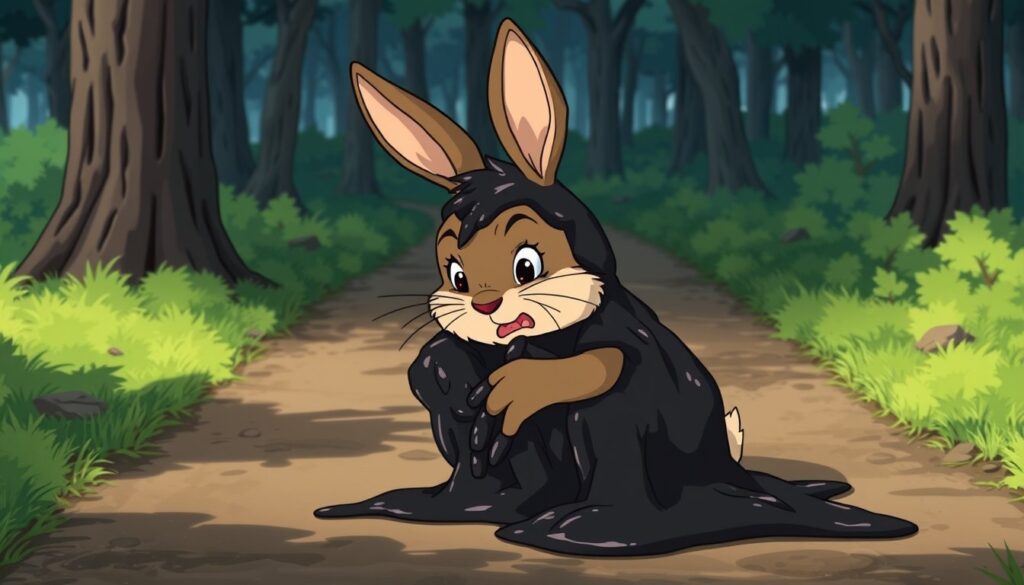John Henry: The Steel-Driving Hero
Howdy, little engineers! Today, we’re gonna tell a tall tale about a real hero, a man named John Henry. In a time when machines were changing the world, one man proved that human strength and spirit could move mountains… or, well, tunnels!”
John Henry’s Early Life and Strength
John Henry wasn’t just born a man; he was born a force of nature. Even as a young boy, his strength was legendary. He could lift rocks that grown men couldn’t budge, carry logs that would have made a team of horses strain, and wrestle with boys twice his size, always with a good-natured grin. He wasn’t just strong; he was kind, always ready with a helping hand for his family, his friends, and anyone in need. He loved to help his mother with chores, lifting heavy water buckets with ease, and he was always building things, crafting toys and tools with his bare hands. He had a natural affinity for the sound of a hammer, the rhythmic clang that echoed through the fields, a sound that seemed to resonate deep within his soul. He was a beacon of positivity, his infectious laughter and boundless energy lifting the spirits of everyone around him. He was the kind of child that made you believe in the power of good, a boy who seemed destined for greatness.
As he grew into a young man, John Henry found his calling on the railroads, the iron arteries that were crisscrossing America, connecting communities and forging a nation. He became a steel-driving man, a master of the hammer, his strength and skill unmatched. He swung his hammer with a rhythm and power that was both awe-inspiring and mesmerizing, each blow a testament to his dedication and skill. He put his heart into every swing, his muscles working in perfect harmony, his movements fluid and graceful. He wasn’t just driving spikes; he was building the nation, one spike at a time, one mile of track at a time. He worked with a sense of purpose, a belief in the importance of his work, a conviction that he was contributing to something bigger than himself. His work was a source of pride, a testament to his strength, his skill, and his unwavering dedication.
But John Henry was more than just a strong man; he was a leader, an inspiration, a force for good in the lives of those around him. He lifted the spirits of his fellow workers, making even the hardest labor seem a little easier, a little more bearable. He shared his food, his water, his laughter, and his encouragement, creating a sense of camaraderie and mutual respect among the men. He was always ready with a joke, a story, or a kind word, his presence a source of comfort and strength. He was the kind of man who made you believe in yourself, who made you feel like you could accomplish anything. He had a way of bringing out the best in people, of inspiring them to push themselves, to work harder, to be better. He wasn’t just a steel-driving man; he was a beacon of hope, a symbol of the enduring power of the human spirit. He was, in every sense of the word, a hero.
The Iron Behemoth and the Shadow of Progress
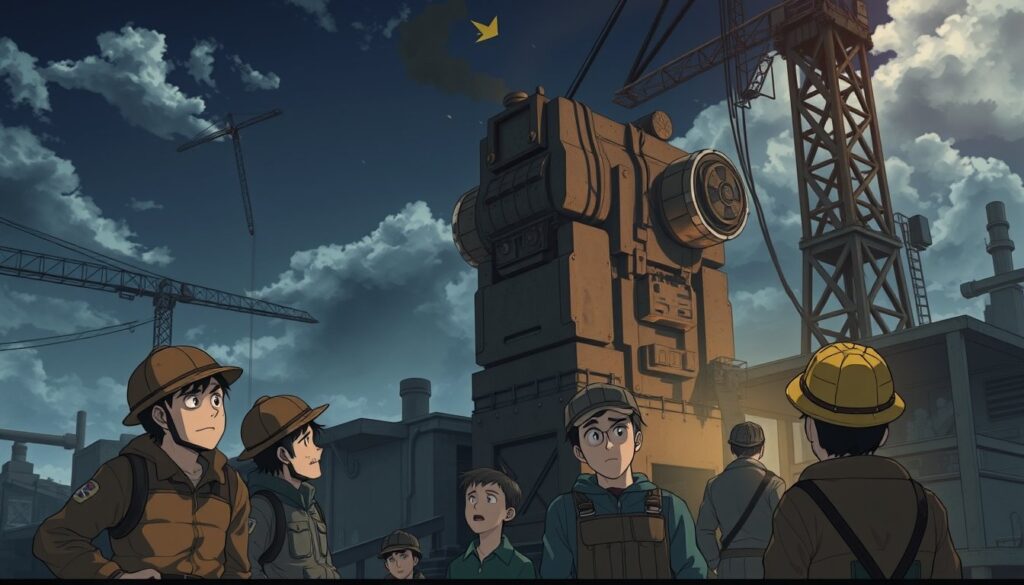
Now, the rhythm of the railroad work, the steady clang of hammers and the shouts of the men, was a familiar song. But one day, that song was interrupted. A new sound, a harsh, mechanical hiss, echoed through the valley. It was the sound of progress, or so they said. A massive, iron contraption, a steam-powered hammer, was being dragged into the work site. It was a behemoth of steel and steam, a machine that promised to revolutionize the way things were done. The workers, their faces etched with a mix of wonder and worry, watched as this strange, clanking creature was set up. It was a sight they’d never seen before, a symbol of a world that was changing faster than they could comprehend. The air grew thick with a sense of unease, a feeling that something significant was about to happen.
This machine, they were told, could drive steel spikes faster, harder, and more consistently than any human could ever dream. The steam hammer pounded with a relentless, mechanical rhythm, its piston driving the hammer with a force that seemed almost inhuman. It was fast, incredibly fast, a blur of motion compared to the steady, rhythmic swings of their own hammers. The workers watched, their hearts sinking. They had prided themselves on their strength, their skill, their ability to work with their hands. But this machine, this iron giant, seemed to render their skills obsolete. Whispers spread among the men, a chorus of fear and uncertainty. ‘Will we still have jobs?’ they asked each other. ‘Will our strength and skill mean anything anymore?’ The familiar sense of camaraderie was replaced by a heavy, suffocating worry. The future, once a clear path of hard work and honest pay, now seemed shrouded in a fog of doubt. A feeling of dread settled over the entire work site, a sense that their way of life was being threatened.
John Henry, standing a little apart from the others, watched the machine with a thoughtful, almost defiant expression. He saw the fear in his fellow workers’ eyes, the uncertainty that gnawed at their hearts. He knew that this machine, this symbol of progress, was more than just a tool; it was a challenge to their very way of life. He looked at his own hammer, the tool that had been his companion, his pride, his livelihood. He felt its weight, the familiar grip of the wooden handle, the cold, hard steel of the head. He knew that this hammer was more than just a tool; it was an extension of himself, a symbol of his strength, his skill, his spirit. He knew that he couldn’t let this machine, this cold, unfeeling contraption, take away the pride and purpose of his fellow workers. He knew he had to do something, something to prove that human strength, human spirit, still mattered. He had to prove that even in a world of machines, the heart of a man was still the most powerful force of all. And in that moment, as he looked from his hammer to the steam hammer, and back again, he made a silent vow, a vow to challenge the machine, to prove that the human spirit could not be replaced.
The Gauntlet Thrown, the Race of Titans
The air crackled with tension as John Henry stepped forward, his voice ringing out with a strength that echoed through the valley. He looked at the foreman, then at the steam hammer, and finally at his fellow workers, his gaze sweeping across their faces, igniting a spark of hope in their hearts. ‘Let’s have a race!’ he declared, his voice firm and unwavering. ‘Me against that steam-powered hammer!’ A hush fell over the crowd, a moment of stunned silence, before a roar erupted, a wave of cheers and shouts that shook the very ground they stood on. The workers, their spirits lifted by John Henry’s courage, were ready to witness a contest unlike any they had ever seen. They knew that this race was more than just a competition; it was a battle for their dignity, for their livelihood, for the very soul of their work.
The whistle blew, a sharp, piercing sound that signaled the start of the race. The contest was on! John Henry lunged forward, his hammer a blur of motion, his muscles working like well-oiled pistons. He swung with a rhythm born of years of experience, a symphony of strength and skill. The steam hammer, with its relentless, mechanical precision, pounded away, its steam hissing and its gears grinding, a testament to the power of the machine. It was a clash of titans, a battle between man and machine, a contest between the human spirit and the cold, unyielding force of technology. The air was thick with the smell of sweat, steam, and hot steel, a tangible representation of the struggle unfolding before them. The pace was relentless, a furious dance of hammers and sparks, a testament to the sheer determination of both man and machine.
The air was a cacophony of sound, a symphony of hammers and steam. John Henry’s hammer rang out with a powerful, rhythmic beat, each strike a testament to his strength and skill. The steam hammer pounded with a steady, mechanical rhythm, its relentless strikes a symbol of the machine’s unwavering power. The workers, their voices hoarse from cheering, rallied behind John Henry, their cries of encouragement echoing through the valley. They were his chorus, his support, his driving force. They believed in him, in his strength, in his ability to overcome the odds. Their voices rose above the din, a wave of human spirit washing over the work site.
John Henry pushed himself harder and harder, his muscles screaming in protest, his breath coming in ragged gasps. He was pushing himself beyond his limits, drawing on a reserve of strength and spirit that he didn’t even know he possessed. He wouldn’t give up, he wouldn’t yield, he wouldn’t let the machine win. He hammered and hammered, the sparks flying like a shower of stars, the steel singing a song of defiance. He was a force of nature, a whirlwind of strength and determination, a symbol of the indomitable human spirit. The steam hammer, however, remained relentless, its power unwavering, its efficiency a testament to the cold, calculating nature of the machine. It was a battle of wills, a contest between the heart of a man and the power of a machine, a race that would determine the future of their work, and their very way of life.
The Price of Victory, the Enduring Flame of Spirit
The final blow landed, a thunderous crash that signaled the end of the race. John Henry stood for a moment, his hammer raised high, a symbol of his hard-won victory. A wave of cheers erupted from the workers, a cacophony of joy and relief that filled the air. They had witnessed a miracle, a testament to the power of human strength and spirit. But their celebration was short-lived. John Henry, his face ashen and his body trembling, staggered and collapsed to the ground. He had pushed himself beyond his limits, his strength spent, his energy drained. He had given everything he had, every ounce of his being, to win this race, to prove that human spirit could not be defeated. The cheers died down, replaced by a hushed silence, a sense of foreboding that hung heavy in the air.
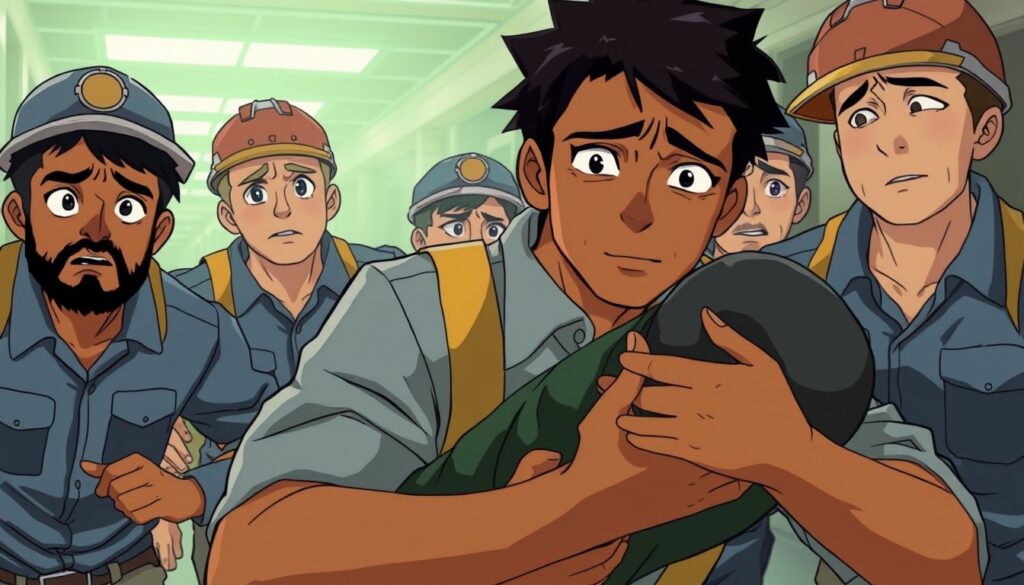
The workers rushed to his side, their faces etched with worry and concern. They cradled him in their arms, their voices filled with sorrow and disbelief. They knew that John Henry had given his all, that he had poured his heart and soul into this contest. But they also knew that he had pushed himself too far, that he had paid a terrible price for his victory. Sadly, John Henry’s heart, strained to its breaking point, gave out. He had pushed himself too hard, his body unable to withstand the immense strain. He had given his life for his belief, for his fellow workers, for the spirit of human endeavor. A wave of grief washed over the crowd, a collective mourning for their hero, their friend, their inspiration. The silence was broken only by the soft sobs of the workers, their hearts heavy with sorrow and loss.
But John Henry’s spirit, the fire that burned within him, could not be extinguished. His story, his sacrifice, his unwavering belief in the power of human strength and spirit, lived on in the hearts of those who knew him. It became a legend, a testament to the enduring power of the human spirit. His story reminded everyone that human strength and spirit were still important, that even machines couldn’t replace the heart of a hero. The workers, their grief tempered by a renewed sense of purpose, continued to build the railroad, their hammers ringing out with renewed determination. They remembered John Henry with every swing, his spirit guiding their hands, his memory fueling their resolve. They worked with pride, with dignity, with the knowledge that they were carrying on the legacy of a true hero. They knew that even though machines were powerful, that the human spirit, driven by courage and determination, was the most powerful force of all.
Conclusion
And so, the legend of John Henry lived on. His story is a reminder that even in a world of machines, human strength and spirit will always shine bright. He showed us that even when things change, hard work and determination will always be important.
Remember, little engineers, even the biggest machines can’t beat the strength of a brave heart. That’s the story of John Henry, the steel-driving hero.
